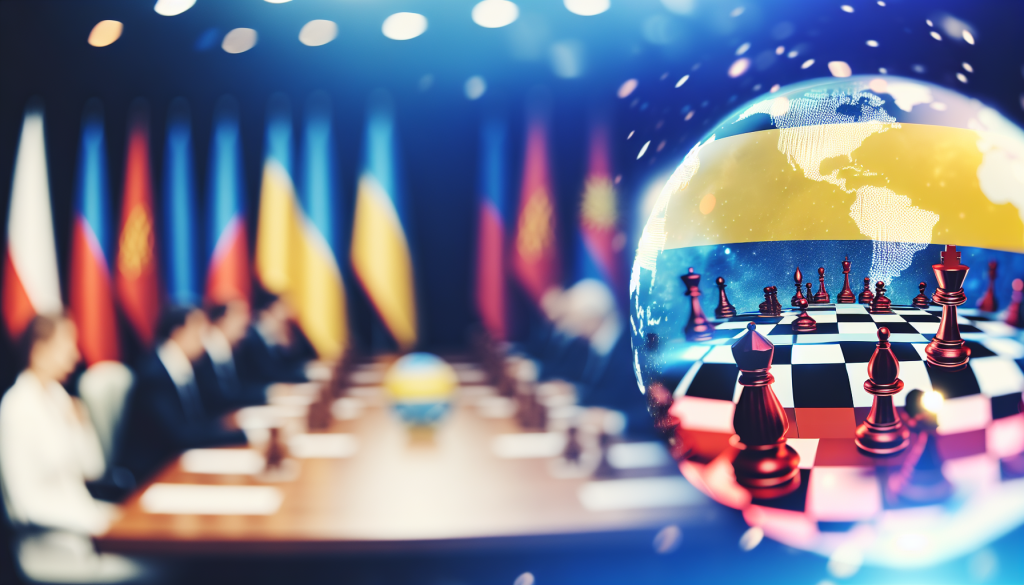Ukraine’s Pursuit of Peace and International Support Amid Ongoing Conflict
Zelensky’s Call for Unity Following Gaza Peace Plans
Ukrainian President Volodymyr Zelensky has recently emphasized the importance of capitalizing on the momentum from the Gaza peace plan. In a tweet following a discussion with Greek Prime Minister Kyriakos Mitsotakis, Zelensky remarked on the significance of the recent ceasefire in the Middle East, viewing it as an opportunity for global unity. He stated that this spirit of cooperation should now be directed towards ending Russia’s ongoing aggression against Ukraine, which he labeled as a major source of instability worldwide. Zelensky’s assertion highlights the interconnected nature of global conflicts, suggesting that establishing peace in one region could catalyze progress in another.
During his conversation with Mitsotakis, Zelensky detailed the urgent challenges faced by Ukraine, particularly in light of recent Russian strikes on its energy infrastructure. He expressed gratitude for Greece’s potential role in contributing to Ukraine’s defense efforts, especially as the country prepares for the harsher winter months ahead. The focus on strengthening air defenses underscores the pressing need for nations to support Ukraine as it navigates the dual threats of military aggression and energy vulnerability.
Germany’s Substantial Military Support for Ukraine
In a related development, Germany has pledged to finance a $500 million U.S. weapons package aimed at bolstering Ukraine’s military capabilities. German Defense Minister Boris Pistorius made this announcement during a meeting in Brussels with allies from the Ramstein group, which gathers support for Kyiv. This significant financial commitment highlights the determination of Western nations to equip Ukraine with advanced military technology, including air defense systems and precision-guided artillery.
The package is part of a broader strategy, with Germany’s total military aid surpassing two billion euros. The provision of additional IRIS-T air defense systems emphasizes Germany’s proactive stance in ensuring Ukrainian forces are better equipped to confront Russian military actions. As European nations unite to bolster Ukraine’s defense, these developments signal a tangible commitment to safeguarding the region’s autonomy.
Economic Stability Through IMF Support
Amid military developments, Ukraine is also focusing on maintaining economic stability. Prime Minister Yulia Svyrydenko recently met with International Monetary Fund (IMF) leaders Kristalina Georgieva and Dan Katz to discuss continued financial support for Ukraine. Under the existing Extended Fund Facility program, Ukraine has successfully navigated a series of reviews, resulting in the disbursement of approximately $10.6 billion.
Svyrydenko highlighted the importance of seamless transitions between financial programs to sustain macro-financial stability during these turbulent times. The dialogue with the IMF reaffirmed positive assessments of Ukraine’s efforts in economic governance despite the challenges imposed by one of the largest wars in Europe in decades. Such international financial support is critical as Ukraine strives to stabilize its economy and navigate the ongoing conflict.
U.S. Initiatives Against Chinese Purchases of Russian Oil
On the global front, the U.S. has signaled readiness to impose tariffs on China due to its significant purchases of Russian oil. Treasury Chief Scott Bessent emphasized that these purchases directly contribute to financing Russian military operations and called for allied European nations to follow suit. This move is part of a comprehensive strategy by the U.S. administration to restrict funding sources for Russia, especially in the wake of ongoing military operations in Ukraine.
In alignment with this strategy, the European Commission is working towards phasing out imports of Russian energy by 2028, reflecting a broader consensus to sever longstanding economic ties with Russia. The move positions both the U.S. and Europe in a united front against continued Russian aggression and aims to dismantle the economic lifelines that support it.
Expanding Military Preparedness in Europe
The efforts to enhance military readiness were also evident in a recent collaboration between Germany and France, which culminated in the signing of an agreement for a satellite-based early warning system. Known as “Odin’s eye,” the system aims to improve missile detection capabilities across Europe, highlighting the proactive measures taken to deter potential threats from Russia.
This technological advancement is expected to bolster collective security and demonstrate a unified European response to the evolving security landscape, where existing defense strategies are being tested more than ever.
Addressing Domestic Leadership Issues in Ukraine
Domestically, Zelensky has made headlines by appointing a new mayor for Odesa in response to a citizenship controversy involving the previous mayor Hennadiy Trukhanov. The dismissal of Trukhanov, who allegedly held dual citizenship with Russia, marks a critical step in reinforcing Ukraine’s stance against Russian affiliations within its territories. By appointing Serhiy Lysak, a former governor, Zelensky aims to strengthen local governance in a strategic port city, vital for both economic and military logistics.
This leadership change illustrates the ongoing challenges Ukraine faces in consolidating national identity and loyalty during wartime, as well as the importance of good governance in times of crisis.
Financial Contributions and Humanitarian Aid
In a collaborative effort to support Ukraine’s military needs, foreign donors have pledged approximately $4.5 billion to a Czech-led initiative aimed at securing large-caliber ammunition for Ukrainian forces. This initiative reflects a significant international commitment to providing Ukraine with the necessary resources for its defense. The Czech Republic has reportedly organized the delivery of millions of artillery rounds, emphasizing the essential role of international coalitions in aiding Ukraine’s defense efforts.
As these developments unfold, it is evident that multiple facets of support—military, economic, and humanitarian—are intricately linked, shaping the geopolitical landscape and the response to Russia’s aggression. Each initiative, agreement, or appointment contributes to a broader narrative of resilience and collaboration as Ukraine continues to navigate its path amidst ongoing conflict.

